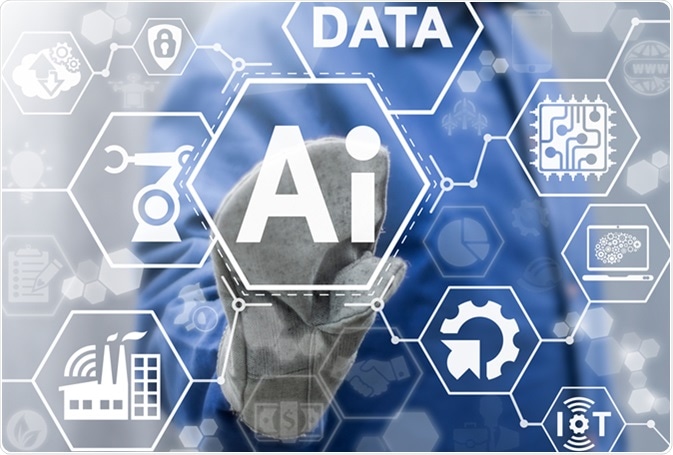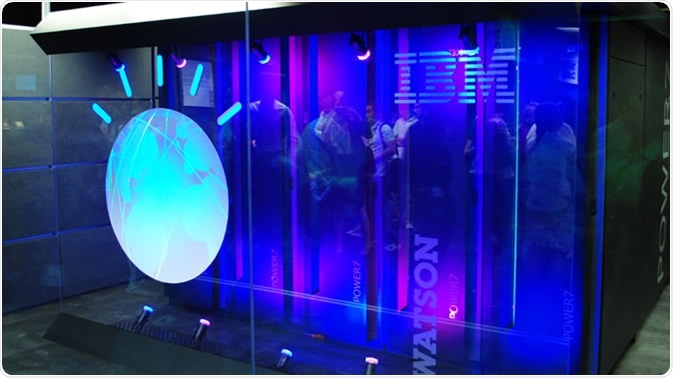The use of Artificial intelligence (AI) is growing in popularity in healthcare and medicine settings. AI should be able by definition to arrive at the optimal solution given a problem, and can be fed information on which to base intelligent decisions about diagnoses and prognoses.

Image Credit: Panchenko Vladimir / Shutterstock
Artificial Intelligence
AI encompasses systems that are not explicitly programmed by an algorithm, but rather learn from exposure to data. The system should arrive at the optimal solution given a problem, making it more than a human-created algorithm and instead a more independent computational intelligence. The layers of the AI analyze the data independently and extract some form of valuable information, which ultimately helps it to make an accurate decision about the problem it is faced with.
There are two main types of AI, called machine learning and deep learning. Machine learning involves several layers of neural networks which process the data, whereas deep learning takes it a step further and allows the system to spot patterns in different layers.
Healthcare
When AI was first being applied to healthcare, the applications for imaging were found to outperform radiologists. Geoffrey Hinton, who has been called the father of deep learning, went so far as to state that training for radiologists should be discontinued, because this class would become obsolete with the advent of commercial AI in analyzing breast and heart images. He later rectified this statement, clarifying that the role of professionals such as radiologists will change because of AI, but not disappear.
Research by Gartner, an advisory company, predicts that AI will create more job than it eliminates. However, the elimination will focus mainly on manufacture whereas healthcare industries face growth from AI.
It is hoped that AI will be able to free up time for the busy healthcare industry by performing repetitive and mundane tasks. It is expected that human and AI processing will be merged to arrive at the optimal solutions. For example, large volumes of data can be overwhelming for humans to sift through but are fully manageable for an AI to extract useful results for interpretation by humans.
Artificial Intelligence in Healthcare – It’s about Time | Casey Bennett | TEDxNashville
In clinical settings, Deep Patient is a deep learning program that can predict diseases. The system was trained on a database of the records of 700,000 patients at a New York hospital. Deep Patient could find patterns indicating which patients were on the way to develop conditions such as liver cancer and schizophrenia. Some predict that such programs, once trained on a large enough set of people, can be used to replace physicians in geographically isolated areas or alleviate doctors’ workload.
Drug Development
Drug development is one area where companies are investing in AI to hopefully speed up and lessen the expense of drug development.
One pharmaceutical giant is using IBM Watson, a machine learning system, to find immune oncology drugs. Several other companies are following suit.

IBM Watson
Most leaders in the medical field believe that jobs and required skills related to drug discovery will change because of this, but the manner of the change is disagreed upon. Some believe the training, undergraduate courses and graduate courses need to become more generalized to incorporate more computer science and machine learning. Others believe the current system should be adhered to, where one person can become an expert on one specific mutation, but that the basics of computer science need to be added on top of that. Some of these changes that are occurring as a result of AI are already visible. For example, some universities have been offering undergraduate degrees in biomedical computation since 2003.
MIT Quest for Intelligence Launch: AI-Driven Drug Discovery
The Future of AI in Medicine
While AI is a priority for some, most large companies are not pushing for more AI at this moment. While the accuracy of AI has been improved to allow it to predict targets for drug development, there are larger problems when dealing with confidential patient information. According to a study on large US health systems, health systems place more importance on strong cyber security than AI development at this moment in time.
Some organizations which are hoping to implement more AI are still facing slow growth. Here, the problem becomes the search for new professionals that can take on the new roles of AI computer experts. Since AIs need to be programmed with real data, this is also likely to open up large amounts of jobs at a pace which may exceed that of job loss.
Further Reading
Last Updated: Nov 27, 2018